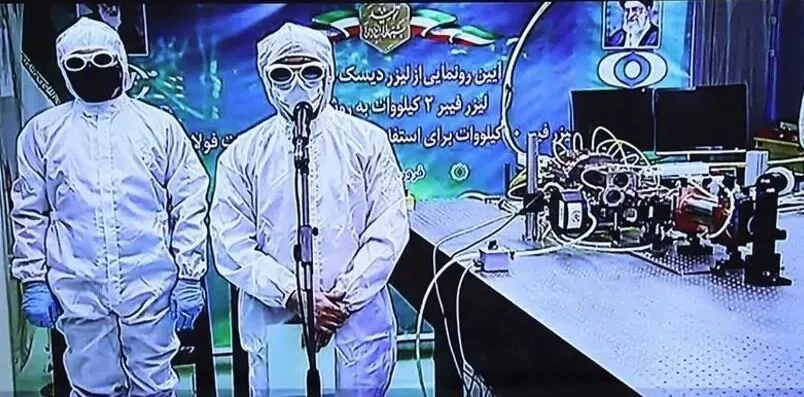Exhibition of nuclear achievements of Iran's Atomic Energy Organization, April 10, 2021 (Credit: president.ir site via Tasnim News Agency).
Iran is pressing Israel and the United States on multiple fronts this week after an explosion at a key Iranian nuclear site caused extensive damage to thousands of nuclear centrifuges. The act of sabotage was first reported on Sunday as a cyberattack against the underground power station at the Natanz nuclear facility, just south of Tehran. Power was cut across the entire complex as both the primary and backup power stations went down in the attack, which occurred just one day after the Iranian nuclear agency publicly announced that a new fleet of advanced centrifuges were operational at the facility. The Iranian regime immediately blamed Israel for the attack and vowed revenge. The Israeli government did not confirm nor deny its apparent involvement, while the US government immediately denied any involvement in the sabotage.
By Monday, multiple sources both inside and outside Iran were reporting that the power outage at the facility was the result of an explosion inside the power substation, located more than 40 meters underground, and was not caused by a cyberattack. The Iranian government admitted as much on Tuesday, revealing that thousands of centrifuges had been damaged or destroyed in the blast, shutting down operations at the plant and setting back the nuclear program by months. The radical regime suggested that the sabotage operation must have been months old, calling it a “beautiful design” involving hundreds of pounds of explosives which had been embedded in equipment. A “traitor” has allegedly been identified and is being sought for arrest, suggesting that the Israeli government was working with Iranian assets inside the regime. Iran threatened retaliation at “a time of its choosing” while vowing to ratchet up it’s uranium enrichment from 20% to 60%, well within the “breakout” threshold for the 90% enrichment required for nuclear weapons fuel. Additionally, an Israeli-owned commercial ship was targeted by a missile in the Gulf of Oman en route to the UAE on Tuesday, causing damage but no casualties. Iranian-aligned militias in Iraq claimed to have raided a Mossad (Israeli foreign intelligence service) safe house in the Kurdistan Region on Tuesday as well; a claim which the Kurdistan Regional Government (KRG) promptly debunked. An explosive drone was subsequently detonated at the US military base near the Erbil International Airport in the Kurdistan region on Wednesday, causing damage to a hanger building, but no casualties.
Since the Stuxnet cyberattack against the Natanz facility was uncovered in 2010, largely believed to to be a joint US-Israeli operation, the Iranian government has taken extensive measures to “harden” the physical and cyber infrastructures of its nuclear sites. A sabotage attack at the Fordow nuclear site in 2012, a similar explosion at an above-ground assembly site at Natanz last July, and the assassination of top Iranian nuclear scientist Mohsen Fakhrizadeh last November have dealt major setbacks to the rouge regime’s nuclear program. However, Sunday’s attack demonstrates Israel’s ability to penetrate Iran’s most guarded projects, and Iran’s determination to confront Israel and the United States throughout the Middle East. An FAI Wire source inside Iran suggests that the regime is attempting to distract the world press away from its recent strategic deal with China, which includes $400 billion in Chinese investment into Iranian infrastructure and energy development (including nuclear development) over the course of 25 years in exchange for heavily-discounted Iranian oil. Besides ongoing threats to its nuclear program and a deepening economic crisis, the Iranian people are suffering a second wave of COVID-19, as hundreds of thousands of new cases are reported every day, forcing the nation of 82 million into another strict lockdown.
We call upon the global Maranatha family to join us in intercession for the people of Iran, Israel and Iraq, as tensions between the Jewish State and the radical ayatollahs continue to rise. We pray for the believers in the Iranian underground churches, as they pray and seek ways to continue outreach and discipleship during the lockdown. We pray that the schemes and plots of the Iranian regime to build a nuclear weapon and act aggressively in the region would be frustrated, and that the Israeli and Western governments would be granted divine wisdom and discernment in containing Iran without provoking a war. As always, we pray that tension, threat and upheaval would drive the people of the Middle East to seek the Lord, and that the Father would send laborers into his harvest field to offer Good News to the harassed and helpless.
Maranatha.





